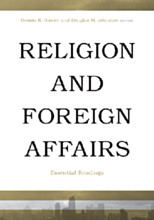I’ve been delayed in writing about my next selection from the City of God–this  one from early in Book II, a book devoted to exploring the extent to which the Roman gods did not protect Romans from sundry disasters. But the particular disasters Augustine has in mind are moral disasters–not disasters of the body but disasters of the soul–and he highlights the vice and civic decay not only enabled but positively stimulated by the Roman gods. Here is Book II, Chapter 6, in full:
one from early in Book II, a book devoted to exploring the extent to which the Roman gods did not protect Romans from sundry disasters. But the particular disasters Augustine has in mind are moral disasters–not disasters of the body but disasters of the soul–and he highlights the vice and civic decay not only enabled but positively stimulated by the Roman gods. Here is Book II, Chapter 6, in full:
This is the reason why those divinities [MOD: in the previous chapter Augustine discusses Cybele, the “Earth Mother,” in particular] quite neglected the lives and morals of the cities and nations who worshipped them, and threw no dreadful prohibition in their way to hinder them from becoming utterly corrupt, and to preserve them from those terrible and detestable evils which visit not harvests and vintages, not house and possessions, not the body which is subject to the soul, but the soul itself, the spirit that rules the whole man. If there was any such prohibition, let it be produced, let it be proved. They will tell us that purity and probity were inculcated upon those who were initiated in the mysteries of religion, and that secret incitements to virtue were whispered in the ear of the elite; but this is an idle boast. Let them show or name to us the places which were at any time consecrated to assemblages in which, instead of the obscene songs and licentious acting of players, instead of the celebration of those most filthy and shameless Fugalia [MOD: civil feasts] (well called Fugalia, since they banish modesty and right feeling) [MOD: I think that Augustine is relying here on the root, ‘fuga,’ meaning ‘flight’], the people were commanded in the name of the gods to restrain avarice, bridle impurity, and conquer ambition; where, in short, they might learn in that school which Persius vehemently lashes them to, when he says:
Be taught, ye abandoned creatures, and ascertain the causes of things; what we are, and for what end we are born; what is the law of our success in life; and by what art we may turn the goal without making shipwreck; what limit we should put to our wealth, what we may lawfully desire, and what uses filthy lucre serves; how much we should bestow upon our country and our family; learn, in short, what God meant you to be, and what place He has ordered you to fill.
Let them name to us the places where such instructions were wont to be communicated from the gods, and where the people who worshiped them were accustomed to resort to hear them, as we can point to our churches built for this purpose in every land where the Christian religion is received.
One of the interesting features of the this chapter and, indeed, the entire book is the extent to which Augustine believes it to be religion’s role to inculcate virtue–including civic virtue–in its adherents. The morality that Augustine is discussing is not a private or interior morality, at least not solely. In the previous chapter, he castigates the Romans for bestowing their finest citizens with the honor of a statue of “that demon Cybele.” Robert Dodaro writes: “[E]ven Rome’s best citizens are deceived by Cybele, the ‘Mother of the Gods.'” Dodaro, Christ and the Just Society in the Thought of Augustine 45. And here, Augustine specifically mentions the morality not of individuals, or even of families, but of “cities and nations.” The context in which he condemns Roman vice is not personal, but public–the feast of Fugalia, which so far as I can tell is a civic feast celebrating the expulsion of the Roman kings. And the fragment he quotes from the stoic Roman satirist Persius concerns both private and public virtue (“how much we should bestow upon our country and our family”).
Augustine clearly believes that it is an important function of religion to inculcate civic or public virtue and honor. Religion is not a privatized or purely personal phenomenon, and any religion worth its salt must do more than “whisper” “secret incitements to virtue” “to the elite” (notice that by highlighting the “elite,” Augustine is emphasizing the importance of religion’s influence on the powerful, including the politically powerful). It must inform their private and public lives. It must provide a public forum–a place of assembly–for the discussion of virtue to occur (not just a private “whispering”). And it must “vehemently lash” public men. Christianity, Augustine believes, performs these functions, while the Roman gods failed to do so.
A final aside: I was struck by the fragment of Persius, because it sounds so much like the words that Dante puts into the mouth of Ulysses in Canto XXVI of Inferno as he sails to the ends of the earth (118-20):
Considerate la vostra semenza:
Fatti non foste a viver come bruti,
Ma per seguir virtute e canoscenza.
“Consider your origins: You were not made to live like beasts, but to pursue virtue and knowledge.” Unfortunately for wandering Ulysses (at least in Dante’s telling), he was not in the end able to discover “by what art we may turn the goal without making shipwreck.”



